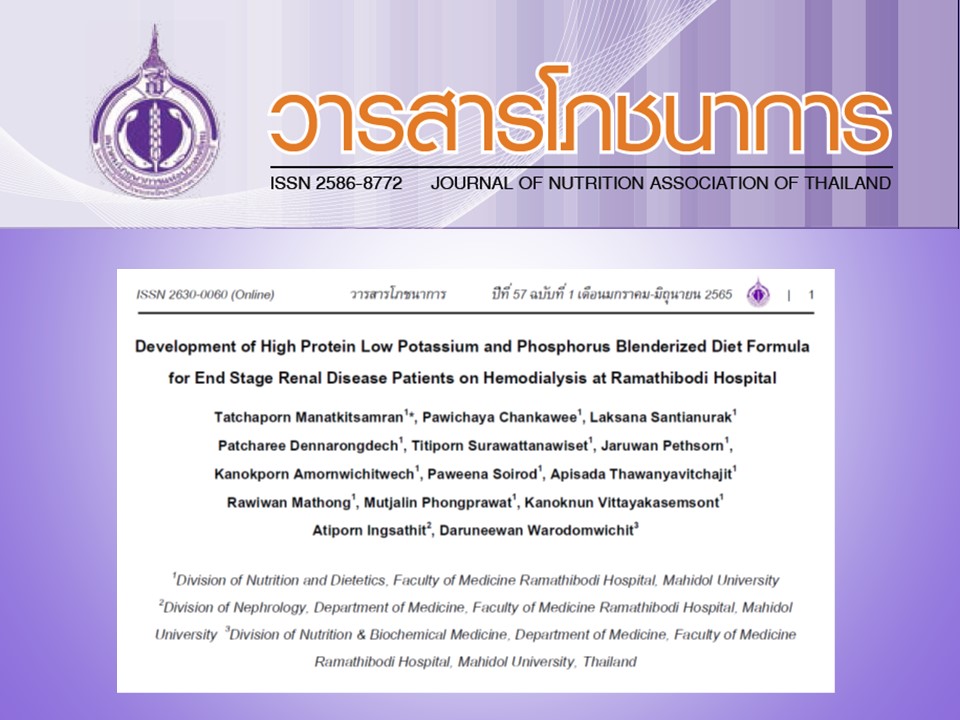Development of High Protein Low Potassium and Phosphorus Blenderized Diet Formula for End Stage Renal Disease Patients on Hemodialysis at Ramathibodi Hospital
Keywords:
Blenderized diet, Hemodialysis, High protein, End stage renal diseaseAbstract
End stage renal disease (ESRD) patients on maintenance hemodialysis (MHD) are at risk of malnutrition due to decreased appetite and require to restrict some dietary intakes, specifically, sodium, potassium, phosphorus and fluid. Currently, only standard hospital-based blenderized diet (BD) formula and diabetes formula are available. This pilot study aimed to develop a new BD formula for ESRD patients who are on MHD. Isocaloric, isonitrogenous BD formulas containing different carbohydrate sources and controlling for potassium and phosphorus contents were developed. The final three formulas with energy density of 1.5 kcal/ml were (1) banana and pumpkin formula, (2) bread formula, and (3) rice formula. Fifty ESRD patients on MHD were enrolled from the renal clinic at Ramathibodi Hospital. The sensory evaluation was performed using a 9-point Hedonic scale on appearance, texture, flavor, smell, color, overall acceptability. Physical properties, including appearance, viscosity, nutritive values and cost were also determined. Results showed that the rice formula had higher overall satisfaction score compared with the bread and banana/pumpkin formula (7.54 ± 1.28, 6.94 ± 1.68, 6.68 ± 1.88, respectively, p < 0.05). In conclusion, all developed formula were acceptable for use by ESRD patients, having highest satisfaction score with the rice formula. These new BD formula can be given orally or by tube feeding in addition to main meals for ESRD patients. It is important that patients are monitored by dietitians and physicians to ensure overall adequacy in energy and other required nutrients.
References
สมาคมโรคไตแห่งประเทศไทย. ข้อมูลการบำบัดทดแทนไตในประเทศไทย พ.ศ 2559-2562.
สมาคมผู้ให้อาหารทางหลอดเลือดดำและทางเดินอาหารแห่งประเทศไทย. คำแนะนำแนวทางเวชปฏิบัติโภชบำบัดสำหรับผู้ป่วยโรคไตในผู้ใหญ่; 2561.
รุจิรา สัมมะสุต อัจฉรา บุญทวี อุดม วารกานนท์ สุระภี เสริมพณิชกิจ สุนทรี สุคนธชาติ. วิธีการเตรียมอาหารทางสายให้อาหารชนิดปั่นผสมสูตรรามาธิบดี.วารสารโภชนบำบัด 2539; 1:7-10.
รุจิรา สัมมะสุต อัจฉรา บุญทวี สุระภี เสริมพณิชกิจ อุดม วารกานนท์ พรรณอร หงษ์โต ประพันธ์พิศ สิตภาหุล. สูตรอาหารเสริมชนิดดื่ม (Oral food supplement formula). เข้าถึงเมื่อ 10 สิงหาคม 2564. เข้าถึงจาก: https://www.lib.ku.ac.th/KUCONF/KC3112001.pdf
Wichchukit S, O'Mahony M. The 9-point hedonic scale and hedonic ranking in food science: some reappraisals and alternatives. J Sci Food Agric. 2015; 95(11):2167-2178.
สำนักโภชนาการ กรมอนามัย กระทรวงสาธารณสุข. ตารางแสดงคุณค่าทางโภชนาการของอาหารไทย (Food composition table of Thai foods).: สำนักงานกิจการโรงพิมพ์องค์การสงเคราะห์ทหารผ่านศึก; 2561.
Kunchit Judprasong, Prapasri Puwastien, Nipa Rojroongwasinkul, Anadi Nitithamyong, Piyanut Sridonpai, Amnat Somjai. Institute of Nutrition, Mahidol University (2015). Thai Food Composition Database, Online version 2, September 2018, Thailand. เข้าถึงเมื่อ 10 สิงหาคม 2564. เข้าถึงจาก: https://inmu2.mahidol.ac.th/thaifcd/home.php
ไพโรจน์ วิริยจารี. การประเมินทางประสาทสัมผัส (Sensory Evaluation). พิมพ์คร้ังที่1. ศูนย์บริหารงานวิจัย มหาวิทยาลัยเชียงใหม่:โรงพิมพ์ตองสามดีไซน์; 2561.
สมพร ชินโนรส. ภาวะทุพโภชนาการของผู้ป่วยที่ได้รับการฟอกเลือดด้วยเครื่องไตเทียม. วารสารสุขภาพกับการจัดการสุขภาพ. 2562; 5(1):1-8.
จักรกฤษณ์ วังราษฎร์, กิติพันธุ์ ฤกษ์เกษม, สุวินัย แสงโย, ศศิณัฏฐ์ พงษ์ธรรม, นิภาภรณ์ ปิ่นมาศ. ปัจจัยทำนายพฤติกรรมการบริโภคอาหารของผู้ป่วย โรคไตวายเรื้อรังระยะสุดท้ายที่ได้รับการฟอกเลือดด้วย เครื่องไตเทียม ณ โรงพยาบาลมหาราชนครเชียงใหม่.วารสารวิจัยระบบสาธารณสุข. 2561; 12(4):625-635.

Downloads
Published
How to Cite
Issue
Section
License
Upon acceptance of an article, copyright is belonging to the Nutrition Association of Thailand.


